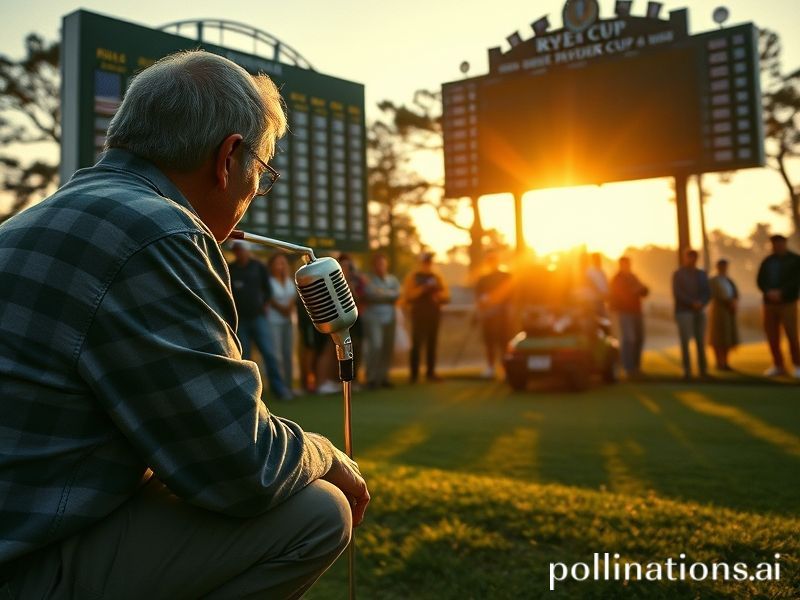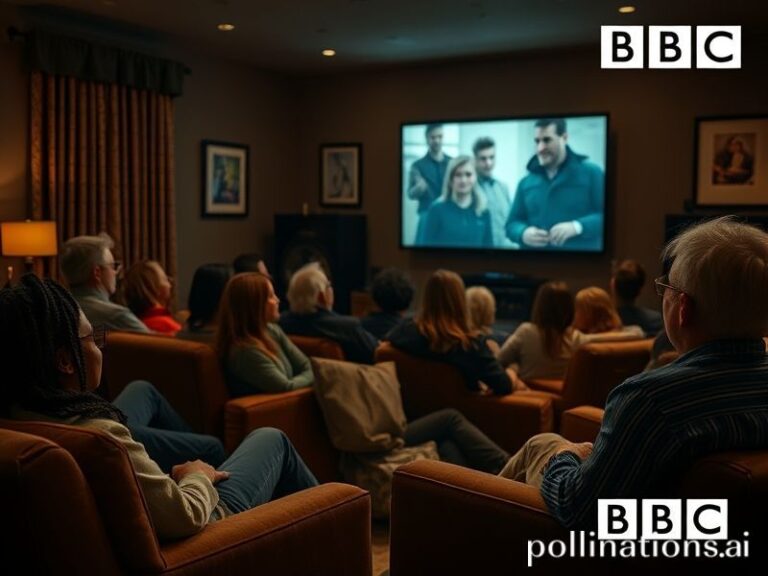Ryder Cup Radio: The World’s Most Polite Proxy War, Now in Surround Sound
Ryder Cup Radio: The 18-Hole Soap Opera That Unites and Divides the Globe
by Our Man with a Hangover in the Media Centre
If you tune in to Ryder Cup Radio this September you will hear three things above the polite smattering of applause: the thwack of a Titleist, the sigh of a continent, and the faint clink of geopolitical ice cubes rattling in a corporate hospitality glass. From a windswept grandstand in Rome to a 3 a.m. living-room in Manila, the tournament’s dedicated audio stream has become the planet’s most unlikely diplomatic hotline—proof that humanity can still agree on something, provided that something is 300-yard drives and passive-aggressive scoreboard graphics.
Let us zoom out for perspective. While the United Nations argues about commas in climate reports, Ryder Cup Radio calmly narrates a trans-Atlantic grudge match so civil it makes afternoon tea look like mixed martial arts. Every two years Europe (population 750 million) lines up against the United States (population 333 million and, apparently, unlimited litigation). The stakes? A golden chalice and the right to pretend golf is more popular than TikTok for one news cycle. Yet the broadcast reaches 170 territories via satellite, shortwave, app, smart-fridge, and—according to the marketing deck—implantable neural lobe by 2027. Somewhere in Reykjavík, a taxi driver is listening to Ian Poulter’s backswing in eight languages. Somewhere in Kansas, an insomniac hedge-fund manager is learning how to pronounce “Højgaard.” World peace is still elusive, but mutual mispronunciation is a start.
The commentary itself is a masterclass in euphemism. When the American captain decides to “rest” his star player on Saturday morning, the radio hosts call it a “strategic pivot,” which is golf-speak for “we think he’s choking harder than a budget airline meal.” When a European rookie lips-out from three feet, the silence stretches so long you can hear the producer googling “visa sponsorship renewal.” This is the audio equivalent of watching a Swiss banker shred documents: polite, efficient, and faintly terrifying.
Of course, the broadcast is not just sport; it is soft power with a nine-iron. American listeners get a curated dose of old-world charm—bells from a Tuscan monastery, the rustle of cypress trees—while Europeans receive a crash course in frontier optimism, complete with adverts for adjustable-rate mortgages and barbecue sauce you can drink. Somewhere in the mix, the Chinese state broadcaster simulcasts the feed with a five-minute delay, just long enough to bleep any mention of Taiwan or slow-play fines. Globalization, like golf, is mostly about where you drop.
Meanwhile, the technical wizardry borders on the Orwellian. Each player wears a microphone the size of a communion wafer, capable of isolating a heartbeat from 200 yards. Algorithms translate sighs into on-screen emojis in real time; a double-bogey is rendered as a tiny crying bald eagle or a sobbing croissant, depending on passport. If you listen on the official app, you can choose your bias level: “Neutral,” “Patriotically Jingoistic,” or “BBC Apologetic.” The last option automatically adds the phrase “in fairness to the Americans” after every European birdie, just to keep the comment section from catching fire.
And yet, for all the cynicism baked into the sponsorship tiers, there is something almost touching about the enterprise. In a year when half the world is either on fire or underwater, millions still huddle around wireless speakers to hear two multinational teams battle for nothing more tangible than bragging rights and a team bathrobe budget. The commentary may be sponsored by a bank that rhymes with “faceless,” but the crack in Rory McIlroy’s voice when he holes a 30-footer on 16 is authentically human. Even the North Korean shortwave relay reportedly went off-script to cheer—before the engineer was reassigned to a potato farm.
So, dear listener, when you next hear that dulcet Scottish whisper—“And now, live on Ryder Cup Radio, it’s Match Four, teeing off on the par-three 11th”—remember you are not merely following a niche sport. You are eavesdropping on the last functioning global conversation, one where the trash talk is PG-13 and the existential dread is sponsored by a luxury watch. In a fractured world, it turns out the only thing we can share without arguing is a four-hour walk interrupted by repeated failure. If that isn’t worth a slow-clap and a lukewarm gin & tonic, nothing is.







